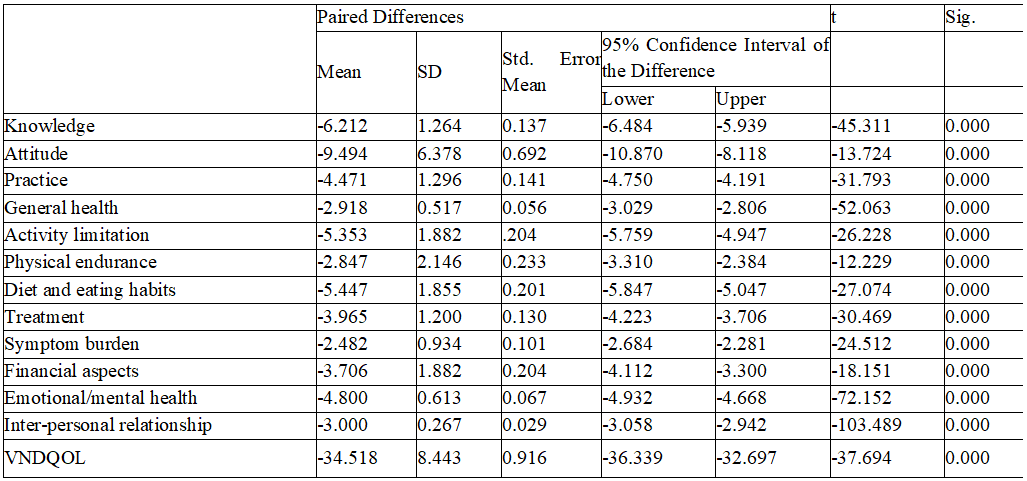Baghianimoghadam MH, Afkhami, Ardekani M, et al. Effect of Education on Improvement of Quality of Life by SF-20 in Type 2 Diabetic Patients. Acta Med Indones-Indones J Intern Med. 2009;41(4):175 - 80.
Adachi M, Yamaoka K, Watanabe M, et al. Effects of lifestyle education program for type 2 diabetes patients in clinics: a cluster randomized controlled trial. BMC Public Health 2013;13:467 - 80.
Smalls BL, Gregory CM, Zoller JS, et al. Assessing the relationship between neighborhood factors and diabetes related health outcomes and self-care behaviors. BMC Health Serv Res. 2015;15:445.
Wong CK, Wong WC, Lam CL, et al. Effects of Patient Empowerment Programme (PEP) on clinical outcomes and health service utilization in type 2 diabetes mellitus in primary care: an observational matched cohort study. PLoS One. 2014;9(5):e95328.
Al-Maskari F, El-Sadig M, Al-Kaabi JM, et al. Knowledge, attitude and practices of diabetic patients in the United Arab Emirates. PLoS One. 2013;8(1):e52857.
Chrvala CA, Sherr D, Lipman RD. Diabetes self-management education for adults with type 2 diabetes mellitus: A systematic review of the effect on glycemic control. Patient Educ Couns. 2016;99(6):926-43.
Babazadeh T, Dianatinasab M, Daemi A, et al. Association of Self-Care Behaviors and Quality of Life among Patients with Type 2 Diabetes Mellitus: Chaldoran County, Iran. Diabetes Metab J. 2017;41(6):449-56.
Baraz S, Zarea K, Shahbazian HB. Impact of the self-care education program on quality of life in patients with type II diabetes. Diabetes Metab Syndr. 2017;11 Suppl 2:S1065-S8.
Watkins KW, Connell CM, Fitzgerald JT, et al. Effect of Adults’ Self-Regulation of Diabetes on Quality-of-Life Outcomes. Diabetes Care. 2000;23:1511 – 5.
Saadia Z, Rushdi S, Alsheha M, et al. A Study Of Knowledge Attitude And Practices Of Saudi Women Towards Diabetes Mellitus. A (KAP) Study In AlQassim Region. The Internet Journal of Health. 2009;11(2).
Tchicaya A, Lorentz N, Demarest S, et al. Relationship between self-reported weight change, educational status, and health-related quality of life in patients with diabetes in Luxembourg. Health Qual Life Outcomes. 2015;13:149.
Nguyen HTT, Moir MP, Nguyen TX, et al. Health-related quality of life in elderly diabetic outpatients in Vietnam. Patient preference and adherence. 2018;12:1347-54.
van der Heijden MM, van Dooren FE, Pop VJ, et al. Effects of exercise training on quality of life, symptoms of depression, symptoms of anxiety and emotional well-being in type 2 diabetes mellitus: a systematic review. Diabetologia. 2013;56(6):1210-25.
Pibernik-Okanovic M, Prasek M, Poljicanin-Filipovic T, et al. Effects of an empowerment-based psychosocial intervention on quality of life and metabolic control in type 2 diabetic patients. Patient Education and Counseling. 2004;52(2):193-9.
Magbanua E, Lim-Alba R. Knowledge and Practice of Diabetic Foot Care in Patients with Diabetes at Chinese General Hospital and Medical Center. Journal of the ASEAN Federation of Endocrine Societies. 2017;32(2):1 - 19.
Karaoui1 LR, Deeb ME, Nasser L, et al. Knowledge and practice of patients with diabetes mellitus in Lebanon: a cross-sectional study. BMC public health. 2018;18(1):525 - 33.
Powers AC. Diabetes mellitus. In: Jameson JL, editor. Harrison’s endocrinology. 19. 3. Derived from Harrison’s Principles of Internal Medicine, 18th Edition ed: McGraw-Hill Education; 2013. p. 261-307.
Saleh F, Mumu SJ, Ara F, et al. Knowledge and self-care practices regarding diabetes among newly diagnosed type 2 diabetics in Bangladesh: a cross-sectional study. BMC public health. 2012;12:1112 - 23.
Al-Maskari F, El-Sadig M, Al-Kaabi JM, et al. Knowledge, attitude and practices of diabetic patients in the United Arab Emirates. PloS one. 2013;8(1):e52857 - 64.
Mohammadi S, Karim NA, Talib RA, et al. Knowledge, Attitude and Practices on Diabetes Among Type 2 Diabetic Patients in Iran: A Cross-Sectional Study. Science Journal of Public Health. 2015;3(4):520 - 4.
Saengtipbovorn S, Taneepanichskul S. Knowledge, Attitude, And Practice (Kap) Toward Oral Health And Diabetes Mellitus Among The Elderly With Type 2 Diabetes, Bangkok, Thailand. J Health Res. 2014;28(6):433 - 41.
Salem A, Majed A, Mahfooz M, et al. Knowledge, Attitude, and Practice Regarding Diabetes Mellitus among General Public and Diabetic Patients in Riyadh, Saudi Arabia. Asian Journal of Pharmaceutics. 2018;12(1):S268 - 76.
Rahaman KS, Majdzadeh R, Naieni KH, et al. Knowledge, Attitude and Practices (KAP) Regarding Chronic Complications of Diabetes among Patients with Type 2 Diabetes in Dhaka. International journal of endocrinology and metabolism. 2017;15(3):e12555-67.
ShimaGhannadi, Amouzegar A, Amiri P, et al. Evaluating the Effect of Knowledge, Attitude, and Practice on Self-Management in Type 2 Diabetic Patients on Dialysis. Journal of diabetes research. 2016;2016:3730875.
Al-Shehri FS. Quality of Life among Saudi Diabetics. Journal of Diabetes Mellitus. 2014;04(03):225-31.
Mathew A, K AT, A AM, et al. Quality of life among type-II diabetes mellitus patients in south india: A descriptive study. American International Journal of Research in Humanities, Arts and Social Sciences. 2014;14(598):197-200.
Didarloo A, Shojaeizadeh D, Alizadeh M. Impact of Educational Intervention Based on Interactive Approaches on Beliefs, Behavior, Hemoglobin A1c, and Quality of Life in Diabetic Women. International journal of preventive medicine. 2016;7:38.
Kargar Jahromi M, Ramezanli S, Taheri L. Effectiveness of diabetes self-management education on quality of life in diabetic elderly females. Glob J Health Sci. 2014;7(1):10-5.



